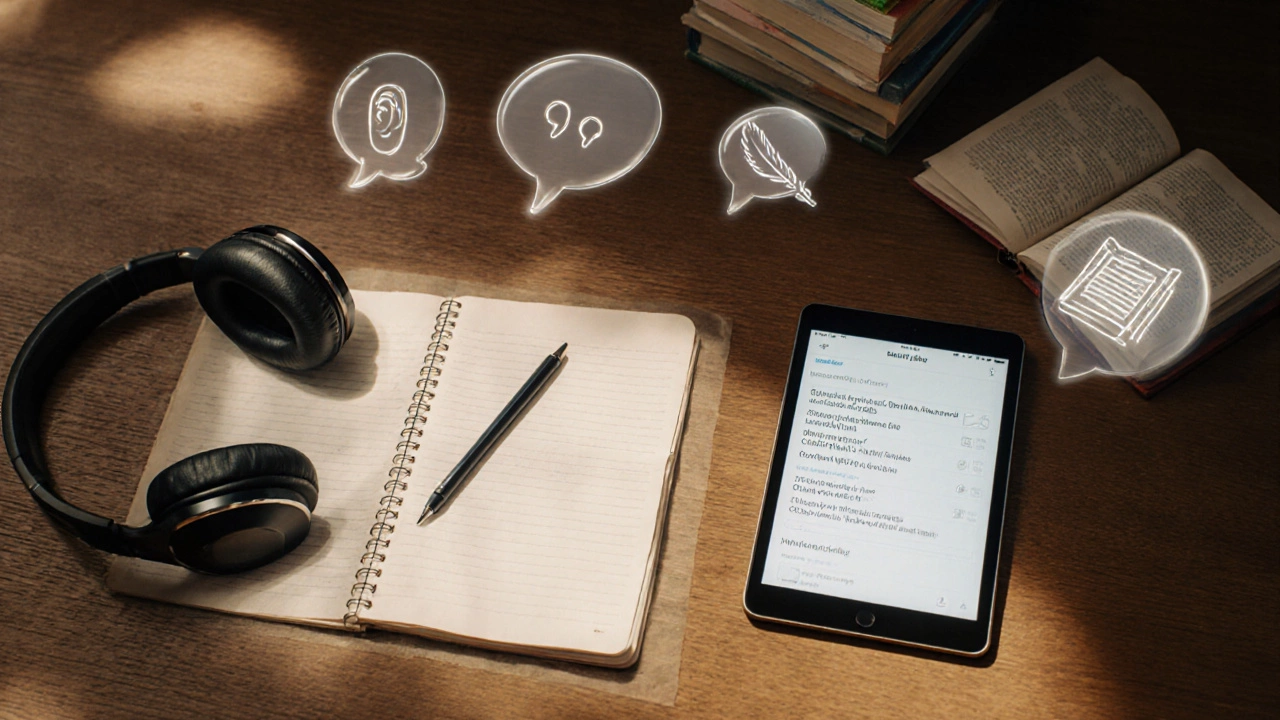Ever had someone ask you to repeat yourself way too many times? That's not just awkward—it slows things down and messes with your confidence. If you often mumble, trip over words, or get that blank look when you talk, it's time for some changes. The good news? Clear speech isn't magic. It's a skill you can practice, like riding a bike or cracking an egg with one hand.
Start by listening to yourself. Seriously. Grab your phone, record a short message, then play it back. You might cringe, but that's how you spot where your words get lost or stuck. Most people never realize where they're unclear until they actually hear their own voices.
You don't need fancy classes right away. Break big words into chunks, slow down, and open your mouth more when talking. You'd be amazed at how just speaking a little slower improves clarity on the spot.
- Why Clear Speech Matters More Than You Think
- Common Habits That Mess Up Your Clarity
- Simple Daily Exercises You Can Start Today
- Useful Tools and Apps to Practice Speaking
- How to Fix Your Pronunciation Fast
- Making Clarity a Habit, Not a Chore
Why Clear Speech Matters More Than You Think
Ever notice how the person who speaks the clearest in a room usually gets the most attention? There’s a reason for that. A study out of UCLA found that clear speakers are seen as more trustworthy and competent—even if they aren’t actually experts. Employers also say that clear communication is in their top three most wanted skills. So, it’s not just about sounding nice; clear speech can give you a real edge, from job interviews to group chats.
Here’s the deal: when people understand you the first time you speak, you save time, avoid confusion, and show confidence. In fact, schools in Australia started special speech training because students with clear speech were getting better grades—not because they were smarter, but because teachers could actually tell what they meant.
It’s not just about work or school either. Friends are less likely to drift off or ask you to repeat yourself when your words are sharp. You get fewer awkward silences and more real conversations. Plus, if you’re still learning English or speaking around people from different backgrounds, clear speech helps everyone follow along without guessing.
Here’s the crazy part: your speak clearly habit actually affects how your brain sorts words and ideas. Researchers say that people who speak with intention and slow down just a little bit remember things better and feel less stress. It’s like giving your brain extra time to process and your listeners extra help to understand.
Common Habits That Mess Up Your Clarity
You ever notice how some people mumble, rush, or just let words slide together until it sounds like they have a mouth full of marbles? A lot of us do this—without even realizing! And even if you know your grammar inside out, these regular habits make your speak clearly skills drop fast.
- Mumbling: The big one is mumbling. If you don't move your lips and jaw enough, you end up swallowing sounds and key parts of words. That makes it super hard for anyone to catch what you're saying.
- Talking too fast: Some folks sprint through sentences when they're nervous or excited. But your mouth can't keep up with your brain, and things start to blur together. People catch about 120-150 words a minute in speech—that's the sweet spot for most listeners.
- Monotone voice: Keeping one flat tone the whole time is not just boring, it also blurs phrases together. Think of natural ups and downs in your pitch—those help people understand.
- Dropping ends of words: Let's be real, especially in casual chat, people chop off the last sounds of words. In English, this habit causes confusion between words like "walked" and "walk."
| Habit | How Common? | Effect on Clarity |
|---|---|---|
| Mumbling | Very common | High |
| Talking too fast | Common in young adults | Medium-High |
| Monotone speech | Common with non-native speakers | Medium |
| Dropping word endings | Extremely common | High |
Even pro speakers slip up. According to a study from the University of California, almost 40% of people who take part in public speaking events admitted to dropping the ends of words when nervous.
“Most of our daily miscommunications aren’t due to accent or vocabulary—they happen when our words just aren’t clear enough.” – Dr. Rachel Smith, Speech Pathologist, American Speech-Language-Hearing Association
If you fix even one of these habits, you'll instantly sound a lot clearer in English conversation. Next time you speak, listen for these speed bumps—they’re easy to miss, but fixing them can totally up your communication game.
Simple Daily Exercises You Can Start Today
You don’t have to spend hours in a language lab or pay for private lessons to get better at speaking clearly. You just need a few minutes daily and some focus. Let’s get practical with some proven ways to level up your clarity.
Speak clearly by warming up your mouth every morning. It sounds silly, but professional actors and radio hosts do it before they go on air. Try this: exaggerate your words when reading headlines out loud. Stretch your lips, move your tongue, and make every sound as crisp as possible. This helps train your muscles to form sounds properly.
Here are a few specific exercises you can try at home:
- The Pencil Test: Place a pencil sideways between your teeth and read something out loud for a minute. Take the pencil out, then read the same line again. You'll notice a big difference—your words suddenly snap into focus because you’ve exercised your jaw and tongue.
- Shadowing: Find YouTube videos or podcasts from clear English speakers. Listen to a few short sentences, then try to repeat them as closely as possible, matching tone, speed, and pronunciation. It’s a bit like karaoke, but for speaking.
- Pause and Breathe: Take short pauses between sentences. It helps keep your voice steady and words sharp. Plus, a slower pace gives your listener time to process what you’re saying.
- Record and Listen: Use your phone to record a 30-second talk every day on something simple. Listening back helps spot which words get swallowed or sound off. Over time, you’ll catch your own habits and improve fast.
- Read Aloud: Pick a short article, recipe, or even an ad and read it out loud. Focus on finishing every word, especially the ends of words, since people often drop their consonants without noticing.
Most people don’t realize that a big reason behind unclear speech is simply lazy muscles in the mouth. Practicing these small drills daily wakes those muscles up. You’ll find yourself sounding clearer, even without thinking much about it. Try them for a week and you’ll actually hear the results.

Useful Tools and Apps to Practice Speaking
If you want to speak clearly, you don’t have to do it alone or rely just on a mirror. Tons of easy-to-use tools and apps are out there to help you, right from your phone or computer. Some are super basic, while others use cool tech like speech recognition to give you instant feedback. Let’s check out a few that make a real difference.
One popular choice is ELSA Speak. This app listens to your pronunciation and points out exactly which sounds are off. You’ll get scores, practice tips, and a bunch of short speaking drills. According to a review in TechCrunch, “ELSA’s speech recognition is surprisingly accurate and adapts to your accent, not just generic English.”
If you want more old-school learning, try Google’s free pronunciation tool. Just Google any English word and tap the speaker button to hear it. You can also record yourself and compare. Simple but super useful if you get tripped up on tricky words.
Speechling is another solid tool. It sets you up with daily speaking challenges, lets you track progress, and you even get coach feedback if you want it. Duolingo, while known for other languages, now has an English speaking side. Their short, game-style speaking exercises help you learn without getting bored.
Some apps don’t just stop at listening. For example, YouGlish lets you search for how words are said in real-life YouTube videos, so you hear many accents and see them in useful, everyday sentences.
Here are a few standout tools and what they offer:
| App/Tool | Main Feature | Price |
|---|---|---|
| ELSA Speak | AI pronunciation coach, feedback on sounds | Free + paid upgrades |
| Speechling | Daily challenges, personal coaching | Free + premium |
| Google Pronunciation | Quick pronunciation check & feedback | Free |
| YouGlish | Video examples, multiple accents | Free |
| Duolingo | Game-style speaking lessons | Free + premium |
Try mixing and matching these tools. If you’re bored of one, switch it up. And don’t forget, apps can’t do all the work—a little daily practice still matters. As speech coach Ann Cook says,
“Your voice is your calling card, and regular practice with the right tools is the key to sounding clear and confident.”
How to Fix Your Pronunciation Fast
Getting your pronunciation right isn’t just about sounding smart—it’s about being understood, whether you’re talking to friends, coworkers, or someone at a cafe. Most adults can boost their speak clearly game in a matter of weeks with the right moves. You don’t have to change your accent, but you do want people to catch what you’re saying the first time, every time.
First, zero in on the sounds that trip you up. For English learners, the usual suspects are the "th" sound (think “this” and “thing”), “v” versus “w,” or ending sounds like “-ed” and “-s.” Don’t just practice words—practice each sound out loud. Google “minimal pairs” for lists that help you drill tricky sounds (like “sheep/ship” or “cat/cut”).
Real talk: most people don’t move their mouths enough when they talk, making things sound muffled. Try exaggerating your mouth movements in front of a mirror. It feels silly but works.
Try this drill:
- Pick a short sentence, like “I can’t believe this is working.”
- Say it slowly, focusing on each sound and mouth shape.
- Record yourself on your phone, then listen back.
- Notice which sounds don’t match native speakers, then repeat and fix just those spots.
There are tools that make this easier. Speech recognition apps like Elsa Speak or Google’s pronunciation tool let you practice and tell you what you’re doing wrong, instantly. Some even show you animated mouth diagrams, which is gold if you’re a visual learner.
Want some numbers? According to a 2023 survey by Duolingo, 71% of English learners struggle most with pronunciation—higher than grammar or vocabulary. That's why focusing just a few minutes daily here pays off fast.
| Tricky Sounds | Example Words |
|---|---|
| Th (/θ/ and /ð/) | Think, This, That, Both |
| V and W | Very, Wet, Vine, Wine |
| S and Z | See, Zoo, Sip, Zip |
| Ending “-ed” | Played, Walked, Needed |
If you can, practice with a friend who’s a native speaker and ask them to correct you. Or, read a short story out loud every day, focusing on clear sounds—not speed. The more you tune in to the exact sounds, the faster you’ll fix things. It’s all about being heard, not just talking.
Making Clarity a Habit, Not a Chore
Most people don’t become great at clear speech overnight. It’s like brushing your teeth—you do it every day, so it becomes automatic. If you want your speak clearly skills to stick, you need a plan that you won’t quit after a week. The trick? Make it fit naturally into your regular life, instead of treating it like extra homework.
For example, set tiny goals: talk clearly for just the first five minutes of every meeting, or practice slowing down your voice when you order coffee. These bite-sized changes don’t kill your motivation, and they really add up.
Here’s a simple daily routine to make clear speech part of your life:
- Read out loud for five minutes every day. News articles or funny memes work fine—just focus on saying each word fully.
- Before calls or meetings, do a quick warm-up: stretch your mouth by saying tongue twisters or reading a sentence three times, each time a little slower and clearer.
- Record a one-minute message to yourself in the morning—talk about your plans for the day, then listen back and check if you can understand every word.
- Pick one new word every day and pronounce it slowly and clearly. Really think about each sound.
- If you notice a word you always mumble, jot it down and practice saying it out loud in different sentences until it feels natural.
Surprisingly, research from the University of Alberta in 2023 found that people who consistently practiced speaking for just ten minutes a day showed a 27% boost in speech clarity after one month. This isn’t just about practice—it’s about building a routine you can actually stick to.
| Action | Time Needed | Success Rate (after 1 month) |
|---|---|---|
| Reading aloud daily | 5 min/day | 22% improvement |
| Recording voice messages | 2 min/day | 18% improvement |
| Warm-up exercises | 3 min/day | 12% improvement |
Last thing—don’t beat yourself up for mumbling words here or there. Progress is about trending upward, not being perfect every moment. When you make a habit out of practicing, clear speech just becomes how you talk, without forcing it.



